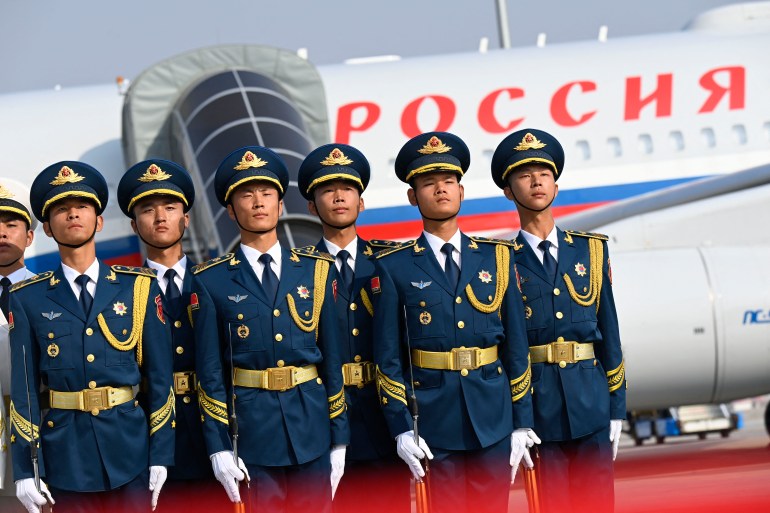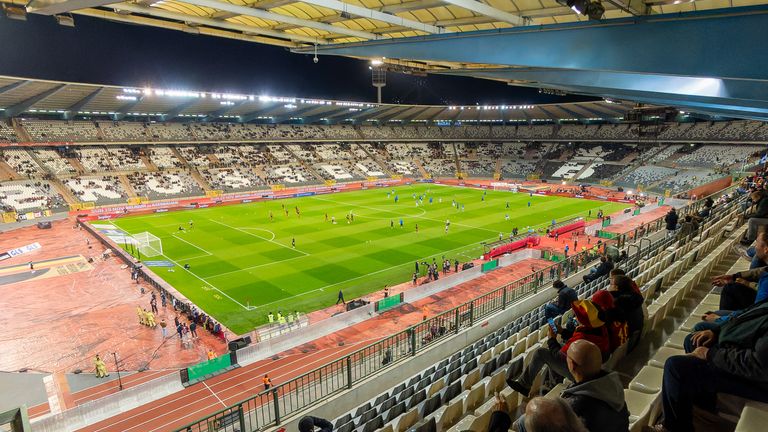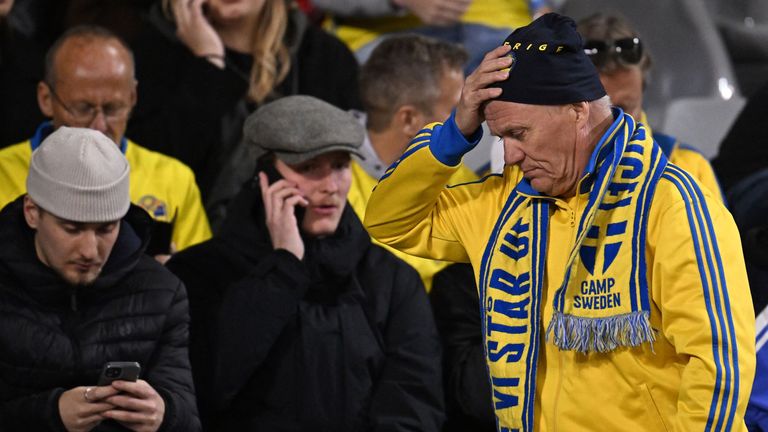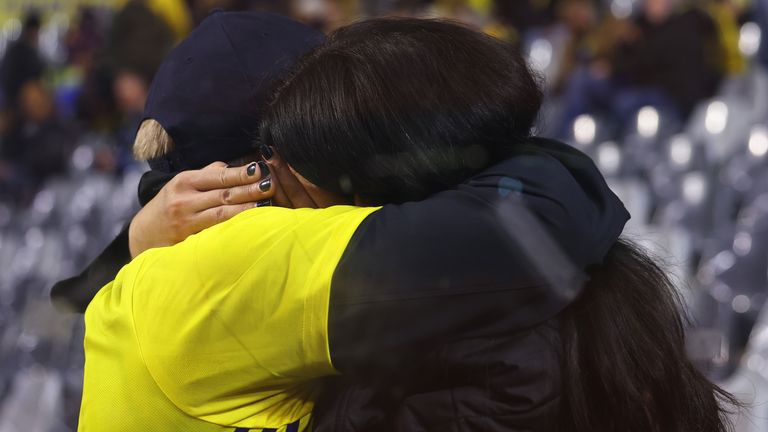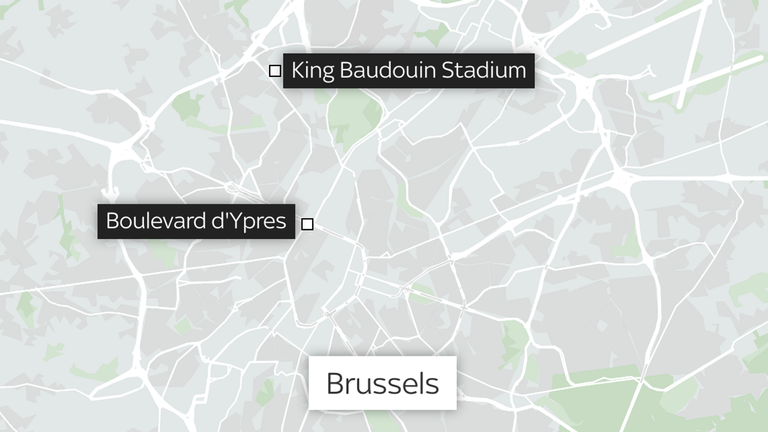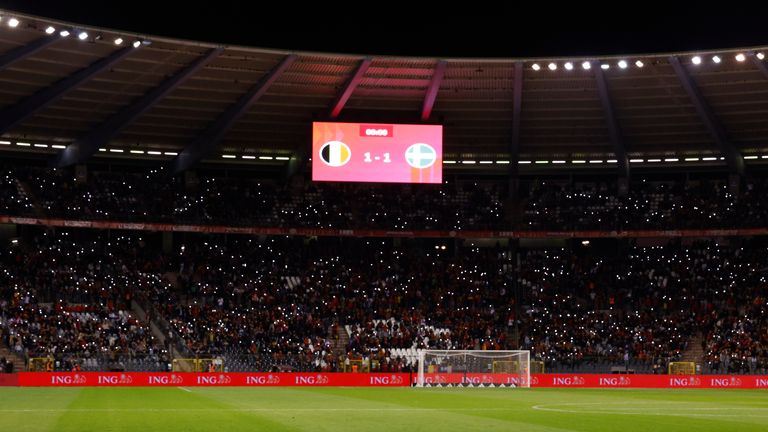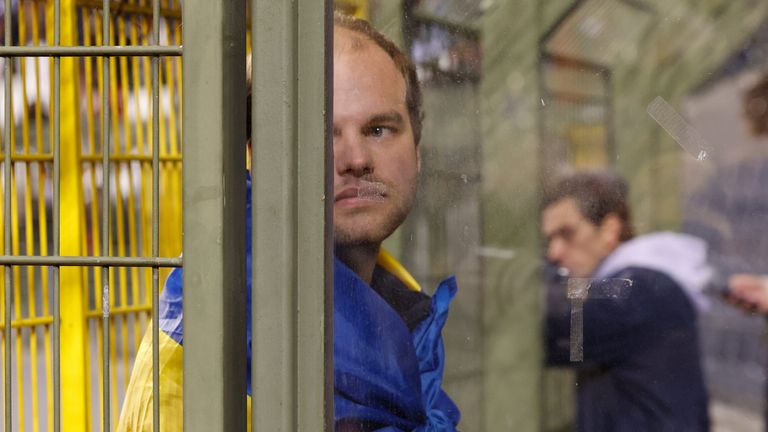US President Joe Biden will visit to Israel on Wednesday, in a significant show of US support.
US Secretary of State Antony Blinken concluded hours of talks with Israeli Prime Minister Benjamin Netanyahu in Tel Aviv early on Tuesday by saying that Biden would visit Israel.
“The president will hear from Israel what it needs to defend its people as we continue to work with Congress to meet those needs,” Blinken told reporters.

Biden would meet with Netanyahu, reaffirm Washington’s commitment to Israel’s security, and receive a comprehensive brief on its war aims and strategy, Blinken said.
“(The) president will hear from Israel how it will conduct its operations in a way that minimizes civilian casualties and enables humanitarian assistance to flow to civilians in Gaza in a way that does not benefit Hamas,” Blinken added.
Blinken also said he and Netanyahu had agreed to develop a plan to get humanitarian aid to Gaza civilians. He did not provide details.
US officials said that a new US coordinator on humanitarian aid, David Satterfield, would work with Israel to develop more concrete plans.
A World Health Organization (WHO) official has said that it believes that there have been 2,800 deaths in Gaza, with 11,000 wounded. It says that half are women and children.
Reuters reports WHO said there have been 115 attacks on health facilities in Gaza
Israel’s health ministry has also issued new casualty figures. It states that 4,229 Israelis have been wounded since Hamas launched its attack on 7 October.
The breakdown of injuries has been given as 26 people in critical condition with 312 in serious condition. 725 people are said to be in a moderate condition and 2,817 are classified as mild. 219 people have been hospitalised for anxiety with a further 130 said to be under medical evaluation.
The Israel Defence Forces spokesperson has posted to social media that Israeli tanks are now attacking “the area from which the shooting was carried out at Metula from Lebanon”.
A British teenage girl said to be missing with her sister after the Hamas attacks has been murdered, her family has told the BBC.
They said on Tuesday morning that 13-year-old Yahel was now confirmed as having been killed in the attack.

Her mother, Lianne, was also killed. Her sister, Noiya, 16, and father, Eli, are still missing.
More details soon …
Haaretz is reporting that “two people were wounded and many mortars hit the town” of Metula in northern Israel. The town is adjacent to the UN-drawn blue line which has divided Israel and Lebanon since 2000.
An Israeli military spokesman said on Tuesday that the status of the Gaza Strip after Israel’s planned ground assault would be a “global issue” for discussion by Israel’s politicians and with other countries.
“We’ve had all kinds of end games,” Daniel Hagari told media during a news briefing, in response to a question about whether Israel’s military planned to stay and govern Gaza after its ground invasion.
“The cabinet is also discussing what that could look like … this is also a global issue, what the situation will look like in this region,” he said.
Hagari said the military had “presented an operational plan” to the Israeli cabinet but did not elaborate.
“Gaza borders other countries … so when we say things on the final status, they will combine the orders of the political level and the military,” Reuters reports Hagari said.
Jordan’s King Abdullah on Tuesday warned against trying to push Palestinian refugees into Egypt or Jordan, adding that the humanitarian situation must be dealt with inside Gaza and the West Bank.
“That is a red line, because I think that is the plan by certain of the usual suspects to try and create de facto issues on the ground. No refugees in Jordan, no refugees in Egypt,” Reuters reports the king said at a news conference after a meeting with the German chancellor, Olaf Scholz, in Berlin.
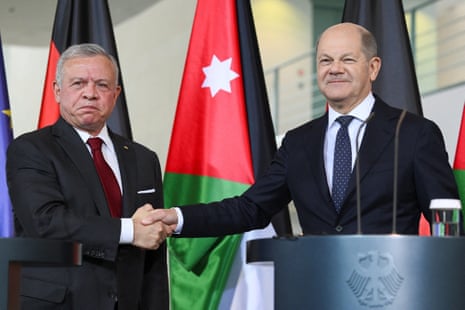
During a joint press conference, Scholz called for preventing an escalation in the Middle East, and said: “I expressly warn Hezbollah and Iran not to intervene in the conflict.”
On its social media feed the Israel Defence Forces have reported further shooting into Israel from Lebanon.
More details soon …
Israel has a “moral and practical responsibility” to allow humanitarian aid into Gaza, the UK’s development minister has said.
Andrew Mitchell also described the situation in the territory as a “looming humanitarian crisis” as he said “all of us must hope” that the US and the Israelis are able to reach an agreement that paves the way for the opening of the Rafah crossing into Egypt from Gaza.
“If there is a plan, I’m sure that it will be possible for the Egyptians to agree to it opening,” the minister told Times Radio.
He also said that some form of “safe zone” in southern Gaza would be required to deliver the aid that was needed, though he warned that such initiatives had a “chequered past”, recalling Rwanda and Srebrenica.
His comments come 24 hours after the Israeli ambassador to the UK, Tzipi Hotovely, told Sky News in the UK that there is “no humanitarian crisis”.
Asked by the Sky News presenter Kay Burley on whether Israel had a right to “cross any border” and go so far as targeting Hamas leaders who are in Qatar, Mitchell said: “The Hamas leaders are guilty of the most heinous crime and the Israeli government will either hunt them down and bring them to justice or they will be killed during the course of the military action that takes place.”
King Abdullah II of Jordan and the German chancellor, Olaf Scholz, are giving a joint press conference at the moment. I’ll bring you any key lines that emerge.
Ministry of health officials in Gaza have told Al Jazeera that the overnight death toll now stands at “at least 71 people”, and that people are trapped in rubble after a night of Israeli bombardments on the Gaza Strip.
Al Jazeera reports that the heaviest bombardments occurred in three areas in the south of Gaza: Khan Younis, Rafah and Deir el-Balah, and that many of those killed are families who had evacuated from Gaza City.
The government media office in Gaza told the news outlet:
The losses of the current Israeli aggression exceed all the wars that Gaza has been exposed to in recent years.
The catastrophic humanitarian reality in Gaza is unprecedented. The international community must take serious and immediate steps to stop the crime of ethnic cleansing.
We demand a quick response to distress calls by bringing relief aid to citizens and humanitarian aid to the service sectors.
A spokesperson for the UN’s relief and works agency (UNRWA) told the BBC that “supplies are dwindling” in Gaza, amid fears “waterborne diseases are going to start spreading”.
Asked what her colleagues in southern Gaza are currently able to provide, Juliette Touma, the UNRWA director of communications, told BBC Radio 4’s Today programme: “They continue to provide assistance wherever possible. UNWRA is overwhelmed. We are overwhelmed. Our supplies are dwindling and running out fast.
“Our staff are also very, very tired. They have been impacted themselves by the war. Many of them lost loved ones, we have sadly at UNRWA lost 14 staff members and these numbers continue to increase.”
Asked if they are operating out of facilities that are reasonably safe from Israeli bombardment, she said: “So no place is safe in the Gaza Strip, at the moment as the bombardments continue.”
She said UNRWA teams were operating from an “overcrowded” warehouse in southern Gaza with “hundreds of people sharing one toilet”, adding: “Our own staff have had to ration drinking water to one litre.”
She said: “In some parts of southern Gaza there was running water as of last night but the water situation is a huge concern. Most of Gaza in fact, the vast majority of Gaza, does not have running water. We are fearful that, waterborne diseases are going to start spreading and are going to start spreading soon.”
She said that “UNRWA has not been able to bring in any supplies, including fuel into the Gaza Strip”.
The Israeli airforce has posted on social media to claim that it has killed four people who were approaching the country’s perimieter fence from the direction of Lebanon. It wrote:
The airforce a short time ago thwarted an attempted infiltration by a terrorist squad, which was identified by IDF surveillance approaching the perimeter fence from Lebanese territory and planting a bomb. Four terrorists were eliminated.
It attached a video to the message which it claimed showed the incident. The claims have not been independently verified.
At least 49 Palestinians were killed in an overnight Israeli strike that hit homes in Khan Younis and Rafah, Reuters reports Gaza’s interior ministry said on Tuesday. The claims have not been independently verified.
It is almost 9am in Gaza City and Tel Aviv. Here is where things stand:
US president Joe Biden will visit Israel on Wednesday, in a significant show of US support. The US secretary of state, Antony Blinken, concluded hours of talks with the Israeli prime minister, Benjamin Netanyahu, in Tel Aviv early on Tuesday by saying that Biden would visit Israel. “The president will hear from Israel what it needs to defend its people as we continue to work with Congress to meet those needs,” Blinken told reporters.
Blinken said the US and Israel had agreed to develop a plan to get humanitarian aid to civilians in Gaza without benefiting Hamas. Blinken made the announcement after hours of negotiations with Netanyahu that stretched into the early hours of Tuesday.
600,000 Gazans have been evacuated from the Gaza City area, following warnings from Israel’s military on Friday, according to Israel Defence Forces spokesperson Jonathan Conricus. In a daily update, Conricus said more than 600,000 people had been evacuated from the Gaza City area, but that 100,000 people still had not left. Israel has warned people to leave the Gaza City area ahead of what it says will be “enhanced military operations” in the coming days. Conricus said the operations would start “when the timing suits the goal”.
More than a week on from Hamas’s massacres in Israel, more than 350 bodies of suspected civilian victims still have not been identified, according to Dr Chen Kugel, the director of Israel’s National Center of Forensic Medicine. Some bodies were burned beyond recognition and others had decayed badly before they were found.
An emergency meeting of the heads of EU member states has been called on Tuesday in an effort to “harmonise” the bloc’s response to the conflict in Israel and Gaza after a week of dysfunction and division.
The IDF said 199 families have now been notified that their loved ones are being held hostage. It is an increase of 40 families, from 155 notified at the time of the last update, he said. He did not say how many hostages this translates to. The increase is not because more hostages have been taken but because new information came to light allowing people to be taken off the list of missing and confirmed as hostages.
Asked whether Biden’s visit will delay ground operations, Conricus said that he does not know, but that he does not think it will. The aim of Biden’s visit is not to “hinder” Israeli operations, he said. “It is to minimise the chances of a regional escalation.” Conricus also said he does not believe there is any plan for Israel to ultimately “hold on to the Gaza Strip”.
The IDF spokesperson was asked during that briefing what there is to stop Hamas fighters going south, too. He said this is “very difficult” and is “one of the downsides” of Israel advertising that it is going to commence enhanced military operations and telling civilians where to go.
Hamas demanded the release of “6,000 male and female prisoners in Israeli prisons” in exchange for hostages it took during its attacks on 7 October. The group’s captives include “high-ranking officers” of the Israeli Defence Forces (IDF), Khaled Meshaal, the head of Hamas’s diaspora office, said. A Hamas spokesperson said there were “about 200-250” Israeli captives in Gaza, a number higher than the earlier statement from the Israeli military that said it had confirmed 199 hostages.
Hamas released a video on Monday showing a statement from one of the captives seized in last week’s attack. In the footage, the woman, whose injured arm is shown being treated by an unidentified medical worker, asks to be returned to her family as quickly as possible.
Iran warned on Monday of a possible “pre-emptive action” against Israel “in the coming hours”, as Israel readies for a ground offensive on the Gaza Strip. Tehran has repeatedly warned that a ground invasion of the long-blockaded Gaza would be met with a response from other fronts – prompting fears of a wider conflict that could draw in other countries. “The possibility of pre-emptive action by the resistance axis is expected in the coming hours,” Iran’s foreign minister, Hossein Amir-Abdollahian said in a live broadcast to state TV, as he referred to his meeting with the Hezbollah leader, Hassan Nasrallah, on Saturday.
The US defence secretary, Lloyd Austin, on Monday spoke to his Israeli counterpart, Yoav Gallant, and reiterated the US’s commitment to avoiding an escalation of the Israel-Hamas conflict and emphasised civilian safety, the Pentagon said in a readout.
The head of Israel’s Shin Bet domestic intelligence agency took responsibility for the Hamas attacks that killed more than 1,400 people on 7 October. “There will be time for investigations. Now we fight,” the Shin Bet director, Ronen Bar, said in a statement.
More now from Gaza’s main hospital:
For over a decade, the grounds of the hospital have largely been spared from bombardments, apart from a strike that hit Shifa’s outpatient clinic in 2014. Instead, a wide area outside the doors to the emergency room welcomes the television crews, local politicians, healthcare workers and civilians who gather there, amid the sound of ambulance sirens and the constant sight of patients arriving on stretchers.
But this time, despite recent efforts by the International Committee of the Red Cross to renovate Shifa’s emergency room, the current crisis has tested the hospital to its limits.
Last week, Israeli officials ordered a “complete siege” of the Gaza Strip, cutting off supplies of water, food, and fuel, meaning Shifa risks losing not just losing mains power to the hospital but also the diesel supplies needed for its backup generators. Days later, the Israeli military issued an evacuation order for all 1.1 million people north of the Gaza River including Gaza City, demanding that they flee south. Shifa hospital, along with several other medical facilities, said evacuating would be impossible. The World Health Organization called the order to evacuate hospitals a “death sentence” for the thousands of sick and injured.
White House officials bristled about whether Biden would ask Netanyahu and Israel officials to show restraint or set any conditions on any new US military aid that could be in the pipeline.
“We are not putting conditions on the military assistance that we are providing to Israel,” Kirby said. “They have a right to defend themselves. They have a right to go after this terrorist threat.”
Israel is also preparing for the potential of a new front opening on its northern border with Lebanon, where it has exchanged fire repeatedly with the Iranian-backed Hezbollah group. The military ordered residents of 28 Israeli communities near the border to evacuate.
European Union leaders will hold an emergency summit on Tuesday as concern mounts that the war between Israel and Hamas could fuel tensions in Europe and bring more refugees in search of sanctuary.
AFP: The Israel-Hamas war is set to overshadow the Frankfurt book fair this week after the postponement of a Palestinian author’s award ceremony sparked condemnation from top writers and the withdrawal of several Arab groups.
The world’s biggest publishing trade event begins on Wednesday, just over a week since Hamas launched the deadliest attack in Israel’s history, prompting Israel to respond with a relentless bombing campaign of the Gaza Strip.
Organisers swiftly denounced the Palestinian militants’ “barbaric” assault and rushed to reorganise the schedule, pledging Israeli voices would feature prominently.
The fair “stands with complete solidarity on the side of Israel”, its director, Juergen Boos, said in a statement.
But the run-up to the five-day event has been overshadowed by a backlash after an award ceremony for the Palestinian author Adania Shibli was postponed.
She was due to receive the LiBeraturpreis, a German award, for her book A Minor Detail, based on the real events of a 1949 rape and murder by Israeli soldiers.
It is organised by Litprom, which gives out the honour each year at the fair, but the group said they had decided not to go ahead with the ceremony “due to the war started by Hamas”.
It said in a statement that it was looking for a “suitable format and setting for the event at a later point”, while insisting that “awarding the prize to Adania Shibli was never in question”.
However, in an open letter released on Monday, more than 600 signatories including high-profile authors, publishers and literary agents, condemned the move.
With the stakes so high, member states are increasing their efforts to keep foreign policy coordinated and on track and will meet by video on Friday afternoon to progress plans for humanitarian support and other issues.
Insiders say there would have been no emergency summit were it not for a series of missteps in the last week in Brussels.
There have been criticism of the European Commission president Von der Leyen’s forthright statements on Israel. She repeatedly defended the country’s right to defend itself in the fact of a terrorist attack but it was days before she also called on Israel to respect international law in its defence.
Such an omission caused anger in some countries, while others complained in phone calls to Michel’s team about overreach and the commission’s failure to consult it on such an important foreign policy topic as Israel.
An emergency meeting of the heads of EU member states has been called on Tuesday in an effort to “harmonise” the bloc’s response to the conflict in Israel and Gaza after a week of dysfunction and division.
As fears grow over the risk of a wider war and a humanitarian catastrophe in the region, EU member states admit they have struggled to put on a united front as they did in February 2023 when Russia invaded Ukraine.
The European Council president, Charles Michel, issued a joint statement on Sunday after a weekend of frantic calls to all 27 member states, but after a week of rows over funding for Palestine and Ursula von der Leyen’s visit to Israel, insiders say the lack of coordination in the past week cannot continue.
There are concerns that the conflict in Israel and Gaza will weaken the coalition of support that the EU had built in the global south involving countries in Africa, the Middle East and Asia. It could also impede efforts to advance the Ukrainian peace process.
https://news.google.com/rss/articles/CBMijAFodHRwczovL3d3dy50aGVndWFyZGlhbi5jb20vd29ybGQvbGl2ZS8yMDIzL29jdC8xNy9pc3JhZWwtaGFtYXMtd2FyLWxpdmUtZ2F6YS1jaXR5LXVwZGF0ZS1uZXdzLXRvZGF5LWpvZS1iaWRlbi12aXNpdC1haWQtcGxhbi1sYXRlc3QtdXBkYXRlc9IBjAFodHRwczovL2FtcC50aGVndWFyZGlhbi5jb20vd29ybGQvbGl2ZS8yMDIzL29jdC8xNy9pc3JhZWwtaGFtYXMtd2FyLWxpdmUtZ2F6YS1jaXR5LXVwZGF0ZS1uZXdzLXRvZGF5LWpvZS1iaWRlbi12aXNpdC1haWQtcGxhbi1sYXRlc3QtdXBkYXRlcw?oc=5
2023-10-17 08:34:00Z
2532739954
